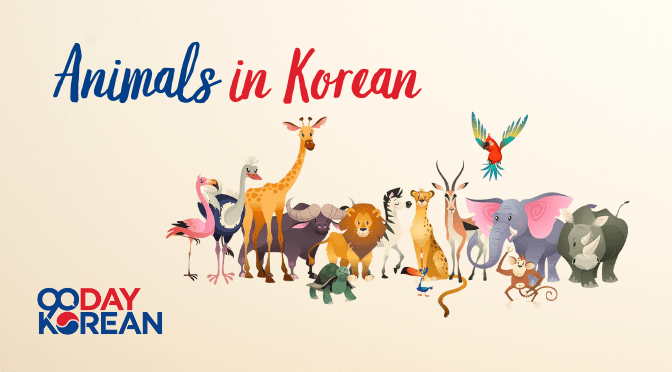Do you know how to talk about animals in Korean?
It’s fun to talk about your favorite wildlife when you learn Korean. So let’s boost our Korean vocabulary and learn the words for all the different creatures.
We’ve made it easy by putting together a list of important words and examples for you.
Dogs, cats, snakes, horses, what do all these words have in common? They’re all animals, and they’re all fun to talk about in Korean.
The Korean words in this lesson are all written in both Hangeul (Korean Alphabet) and romanized English. You’ll be able to learn Korean much faster if you know the alphabet, and you can learn how to read before your next meal.
Let’s get rolling!
Contents
“Animal” in Korean
To start out, we should know that the word “animals” in Korean is 동물 (dongmul)
동물 (dongmul)
animal
We didn’t forget the simple Korean sentences to help you start some conversations! The sentences you can find throughout the article are in standard Korean and are considered polite, and you can use them in most situations.
For example:
동물을 좋아하세요? (dongmureul joahaseyo?)
Do you like animals?
제일 좋아하는 동물은 뭐예요? (jeil joahaneun dongmureun mwoyeyo?)
What is your favorite animal?
“Zoo” in Korean
While there are a lot of Korean animals in the wild in South Korea, you’ll probably tend to see most of them at the 동물원 (dongmulwon). Any idea what that is? It’s a place where you’ll see a lot of Korean animals in one place.
동물원 (dongmulwon)
zoo
For example:
저는 지난주에 동물원에 갔어요. (jeoneun jinanjue dongmurwone gasseoyo.)
I went to the zoo last week.
Now that we have that out of the way let’s look at some lists of animals. Keep in mind that these are very general lists, and many animals could be included in multiple lists. We’re just keeping it simple.
“Pets” in Korean
The word “pets” in Korean is 반려동물 (banryeodongmul).
For example:
저는 반려동물 많아요. (jeoneun balryeodongmul manayo)
I have a lot of pets.
If you’re a pet lover, you’ll love our first list. These are animals raised as pets. The top 3 are the most popular ones.
“Dog” in Korean
Dog in Korean is 개 (gae). It is one of the most common pets, not just in Korea.
For example:
어젯밤 내 이웃집 개가 크게 짖었어요. (eojetbam nae iutjip gaega keuge jijeosseoyo.)
My neighbor’s dog barked loudly last night.
매일 저녁에 개랑 산책해요. (maeil jeonyeoge gaerang sanchaekhaeyo.)
I take a walk with a dog every evening.
이웃집 개가 시끄럽게 짖고 있어요. (iutjip gaega sikkeureopge jitgo isseoyo.)
The neighbor’s dog is barking loudly.
“Puppy” in Korean
“Puppy” in Korean is 강아지 (gangaji).
For example:
강아지와 산책을 하는 것은 즐거워요. (gangajiwa sanchaegeul haneun geoseun jeulgeowoyo.)
Taking a walk with a puppy is fun.
“Cat” in Korean
The third most common pet is a cat. A cat in Korean is 고양이 (goyangi).
For example:
고양이는 아주 깔끔한 동물이에요. (goyangineun aju kkalkkeumhan dongmurieyo.)
Cats are very neat animals.
| Pets in Korean | English |
|---|---|
| (gae) | dog |
| (gangaji) | puppy |
| (goyangi) | cat |
| (sae) | bird |
| (mulgogi) | fish |
| (tokki) | rabbit |
| (haemseuteo) | hamster |
| (ginipigeu) | guinea pig |
Farm Animals in Korean
Generally, there are many animals we can see on a farm. But in this lesson, we’ll give you a list of the common farm animals in Korean.
| Farm Animals in Korean | English |
|---|---|
| (mal) | horse |
| (jorangmal) | pony |
| (so) | cow |
| (jwi) | mouse |
| (dwaeji) | pig |
| (yeomso) | goat |
| (yang) | sheep |
| (nabi) | butterfly |
| (dak) | chicken |
| (ge) | crab |
| (badatgajae) | lobster |
| (chilmyeonjo) | turkey |
“Cow” in Korean
The farm animal “cow” in Korean is 소 (so). The moo of a cow is 음메 (eumme).
“Horse” in Korean
A horse in Korean is called 말 (mal).
말을 타본 적이 있어요? (mareul tabon jeoki isseoyo?)
Have you ever ridden a horse?
그들은 경주용 말이에요. (geudeureun gyeongjuyong marieyo.)
They are racing horses.
A zebra, on the other hand, is a striped horse called 얼룩말 (eollukmal).
“Chicken” in Korean
A chicken is a common farm animal. “Chicken” in Korean is called 닭 (dak).
This video shows How to Say “Chicken” in Korean
“Crab” in Korean
The crab can also be a farm animal, and the “crab” in Korean is 게 (ge).
“Snow crab” is called 대게 (daege). It may come as a surprise to you that crabs are on the list of farm animals.
“Pig” in Korean
The word for pig in Korean is 돼지 (dwaeji), and it makes the sound 꿀꿀 (kkulkkul), which is the Korean term for oink.
Forest Animals in Korean
Here is a list of some popular forest animals in Korean.
| Forest Animals in Korean | English |
|---|---|
| (neukdae) | wolf |
| (saseum) | deer |
| (hwangso) | ox |
| (koppulso) | rhinoceros |
| (neoguri) | raccoon |
| (yeou) | fox |
| (santokki) | hare |
| (osori) | badger |
| (gom) | bear |
| (daramjwi) | squirrel |
| (hama) | hippo |
| (panda) | panda |
“Bear” in Korean
“Bear” in Korean is 곰 (gom). This is the word used for the animal “bear.”
For example:
캐나다에는 곰이 많이 있어요. (kaenadaeneun gomi mani isseoyo.)
There are many bears in Canada.
그 동물원에서 북극곰도 있던데. (geu dongmulwoneseo bukgeukgomdo itdeonde.)
That zoo has polar bears as well.
“Teddy Bear” in Korean
You might also notice the Korean word for bear in the word 곰인형 (gominhyeong), which is teddy bear.
For example:
그 곰 인형은 그가 좋아하는 장난감이었어요. (geu gom inhyeongeun geuga joahaneun jangnangamieosseoyo.)
The teddy bear was his favorite toy.
“Panda” in Korean
The word for panda in Korean is 판다 (panda). This one is an easy one because the Korean word for “panda” sounds similar to the English word!
For example:
팬더는 사랑스러운 동물이에요. (paendoneun sarangseuroun dongmurieyo.)
Panda is a lovely animal.
내 제일 좋아하는 동물은 판다야. (nae jeil joahaneun dongmureun pandaya.)
My favorite animal is panda.
“Wolf” in Korean
There are 2 animals that commonly appear in popular K-Dramas and K-Pop songs, and one of them is the wolf. Wolf in Korean is 늑대
“Fox” in Korean
The 2nd common animal that appears in Korean songs and dramas is the fox. Fox in Korean is 여우. Fox is commonly used as an expression.
Aquatic Animals in Korean
At this point, we’ll learn a few of the many sea animals.
Below is a list of Korean words for popular aquatic or sea animals.
| Aquatic in Korean | English |
|---|---|
| (gorae) | whale |
| (geobuk) | turtle |
| (ageo) | crocodile |
| (gaeguri) | frog |
| (mulgae) | seal |
| (sudal) | otter |
| (dolgorae) | dolphin |
| (sangeo) | shark |
| (ojingeo) | squid |
| (muneo) | octopus |
| (ingeo) | carp |
| (godeungeo) | mackerel |
| (jangeo) | eel |
| (gaori) | stingray |
“Octopus” in Korean
The aquatic animal “octopus” in Korean is 문어 (muneo). It’s an aquatic animal that’s abundant in Korean ocean.
“Squid” in Korean
The squid is another popular aquatic animal. “Squid” in Korean is 오징어 (ojingeo).
Birds in Korean
Birds are lovely animals. They’re beautiful because of their colorful feathers. Before we learn about the different terms used for birds in the Korean language, let’s learn what the word “bird” in Korean is. “Bird” in Korean is 새 (sae).
하늘에 새들이 날고 있어요. (haneure saedeuri nalgo isseoyo.)
Birds are flying in the sky.
Here is a list of different birds with their corresponding Korean meaning.
| Birds in Korean | English |
|---|---|
| (aengmusae) | parrot |
| (kkaji) | magpie |
| (chamsae) | sparrow |
| (kkamagwi) | crow |
| (gongjak) | peacock |
| (bidulgi) | dove |
| (penggwin) | penguin |
| (tajo) | ostrich |
| (durumi) | crane |
| (baekjo) | swan |
| (doksuri) | eagle |
| (galmaegi) | gull |
| (ori) | duck |
| (geowi) | goose |
| (mae) | hawk |
Various Wild Animals in Korean
There are many wild animals seen in the wild of Africa. Most of them can be seen in big zoos near us.
To know more about the various wild animals, here’s a list of them.
| Various Wild Animals in Korean | English |
|---|---|
| (saja) | lion |
| (horangi) | tiger |
| (gorilla) | gorilla |
| (wonsungi) | monkey |
| (chimpaenji) | chimpanzee |
| (orangutan) | orangutan |
| (eollukmal) | zebra |
| (pyobeom) | leopard |
| (chita) | cheetah |
| (kokkiri) | elephant |
| (girin) | giraffe |
| (baem) | snake |
| (nakta) | camel |
| (haiena) | hyena |
| (yeongyang) | antelope |
| (deulso) | bison |
| (mulso) | water buffalo |
| (bukgeukgom) | polar bear |
| (koalla) | koala |
| (domabaem) | lizard |
| (kaengeoru) | kangaroo |
| (dalpaengi) | snail |
| (mogi) | mosquito |
| (gaemi) | ant |
| (beol) | bee |
“Monkey” in Korean
Monkey in Korean is 원숭이 (wonsungi).
For example:
원숭이는 나무를 잘 탄다. (wonsungineun namureul jal tanda.)
Monkeys are good at climbing trees.
On the other hand, an “ape” is called 유인원 (yuinwon).
“Elephant” in Korean
The “elephant” in Korean is 코끼리 (kokkiri).
“Giraffe” in Korean
“Giraffe” in Korean is 기린 (girin).
Korean National Animals
The national animal of South Korea is the tiger. The animal tiger is 호랑이 (horangi) in Korean.
The Siberian tiger is in many mythical stories in Korean culture, and some even think the Korean peninsula resembles a tiger.
Korean National Bird
The Korean national bird is the Asian magpie. This bird is called 까치 (kkaji) in Korean.
Wrap Up
So today, you’ve learned a lot of different wildlife vocabulary in Korean! Was there one we forgot but you’d like to know? Let us know, and we’ll add it to the list.
What’s your favorite animal? Whether it’s a cat, dog, horse, mouse, chicken, or even a snake, see if you can make a Korean sentence with it. Leave it in the comments below, and we’ll check your Korean!






It’s an elaborate list of animal vocabulary. Thank you for doing this.
Thanks for your comment! ^^ If you want to know more about the Korean language and culture, you can also check our blog and visit our YouTube channel for articles and videos with great Korean content.
Extremely helpful in getting a feel of Korean vocabulary
Thanks for your comment, Anil! I’m glad to hear that our article was helpful to you! ^^ You can also check our our article on Korean Words and Basic Vocabulary That Are Used Most Often to learn more of the basic vocabulary that is commonly used in everyday life in Korea.
If you want, you can also check our blog and visit our YouTube channel for articles and videos with great Korean content.
This is so helpful I can write them down whenever I want i sometimes have motivation on learning languages but I haven’t learned any, I can do a little introduction and speak in korean 근대 한국어 너무 딱딱해 (I hope I said that right lol idk how to)
Thanks for sharing! I’m glad that our article has been helpful to you. ^^ If you want to learn Korean, we have a step-by-step resource guide called Learn Korean Online: How-To Guide for Language Study, which you can follow.
You can also check our blog and visit our YouTube channel for articles and videos with great Korean content.
Thanks
Cool, thanks for your comment! ^^ If you want to learn more about Korean, you can also check our blog and visit our YouTube channel for articles and videos with great Korean content.
your stuff is so helpful! i can’t stop using it, thank you so much <3
Awesome, thanks for your kind words! ^^ I’m glad that our articles have been valuable to you. ^^ If you want to have more Korean lessons, you can also check our blog and visit our YouTube channel for articles and videos with great Korean content.